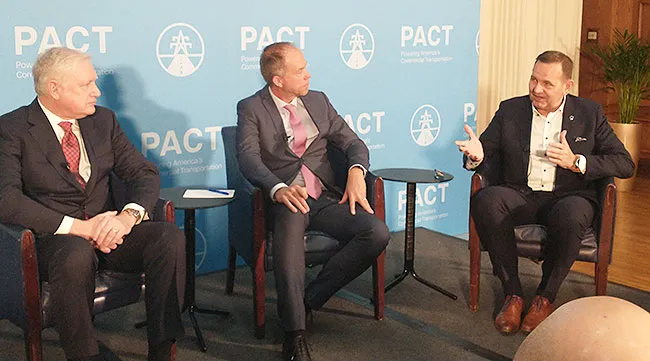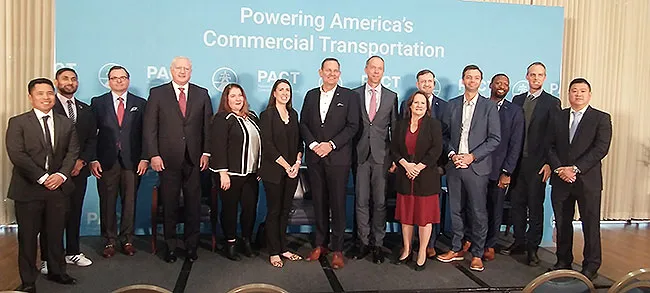Truck Makers Form Zero-Emission Infrastructure Coalition for Sustainable Transportation
In today's rapidly evolving world, the demand for sustainable transportation is on the rise. As concerns about climate change continue to grow, industries are facing pressure to reduce their carbon footprint and adopt environmentally-friendly practices.
In response to this call for change, leading truck manufacturers have joined forces to form the Zero-Emission Infrastructure Coalition (ZEIC). This coalition, comprised of major players in the trucking industry, aims to accelerate the adoption of zero-emission vehicles and create a more sustainable future for transportation.
Through this collaboration, the ZEIC will work towards building a comprehensive and efficient infrastructure for zero-emission trucks.
This article will delve into the details of this pioneering coalition, exploring its goals, strategies, and potential impact on the trucking industry.
We will also examine the current state of zero-emission transportation and the challenges that lie ahead. With the ZEIC's commitment to driving the shift towards a greener transportation sector, this article will shed light on the potential for a more sustainable future for the trucking industry.
Launched To Facilitate
A collaborative effort among leading truck manufacturers is being launched to facilitate the advancement of charging and refueling infrastructure for medium- and heavy-duty zero-emission vehicles. Known as Powering America's Commercial Transportation (PACT), this coalition, comprised of Daimler Truck North America, Navistar Inc., and Volvo Group North America, aims to educate and collaborate with stakeholders in order to expedite the construction of essential infrastructure.
PACT intends to engage policymakers, regulators, and other relevant parties in Washington, as well as across the nation, to familiarize them with the specific infrastructure requirements of the trucking industry in terms of zero-emission solutions. It is worth noting that the companies involved in this joint endeavor represent five out of the top seven U.S. Class 8 brands based on sales.
Daimler Truck oversees esteemed brands such as Freightliner and Western Star, Navistar operates International Trucks, and Volvo Group North America is responsible for Volvo Trucks and Mack Trucks.
Constructing the necessary infrastructure to facilitate the charging or refueling of zero-emission vehicles is widely recognized as a significant challenge in expanding the availability of alternatives to diesel-powered trucks in the commercial sector. Electric utility providers face hurdles when it comes to persuading state regulators of the imperative need to allocate resources towards bolstering the development of electric infrastructure.
Necessitates Crucial Decisions
PACT emphasizes that the prompt establishment of reliable and accessible infrastructure for zero-emission trucks necessitates crucial decisions regarding capital investment, upgrades to the electrical grid, and the implementation of dedicated charging equipment.
As per the findings of the International Council on Clean Transportation, an estimated 1.1 million class 4-8 M/HD ZEVs are projected to be operational by 2030. To support this fleet, approximately 600,000 charging stations will be required, resulting in a daily electricity consumption of 140,000 megawatt-hours. This energy demand is equivalent to the daily usage of 4.9 million households in the United States.
Daimler Truck North America CEO, John O'Leary, emphasizes the significance of decarbonizing the commercial transportation sector in achieving our nation's climate objectives. However, the progress towards zero-emission vehicles is hindered by the insufficient deployment of essential charging infrastructure.
To address this challenge, the PACT initiative aims to expedite the establishment of robust charging networks, enabling fleets to adopt ZEVs on a large scale. Such efforts will lead to significant reductions in emissions and provide us with the environmental benefits at the earliest possible time.

During the inauguration of the coalition in Washington on January 30, O'Leary, alongside other prominent OEM executives, expressed their conviction in the transition rather than feeling coerced. O'Leary emphasized that the coalition's commitment stems from a genuine belief in the potential of this shift.
Mathias Carlbaum, the president and CEO of Navistar, highlighted the crucial requirements of commercial vehicle customers in deploying ZEV fleets on a large scale. He emphasized the necessity for a swift, dependable, cost-effective, and user-friendly power infrastructure to ensure the success of these fleets.
Recognizing the unique needs of the commercial transportation industry, Carlbaum stressed the significance of collaborative efforts across sectors. PACT serves as a dedicated platform that strives to transform this vision into a tangible reality, effectively expediting the positive impact of sustainable mobility.

An Unprecedented Level
According to Stephen Roy, Chairman of Volvo Group North America, the adoption of medium- and heavy-duty electric vehicles (EVs) requires an unprecedented level of infrastructure. He emphasizes the importance of understanding and coordination among different stakeholders to ensure the quick and cost-effective deployment of charging stations.
During the launch event, Carlbaum acknowledges that transitioning to EVs represents a cultural change and an exploration into uncharted territory. However, he believes that the transportation landscape in the U.S. is well-suited for electrification.
O'Leary highlights how the push for electrification and coordination is bringing together industry players who may not have previously engaged with one another. He emphasizes the need for collaboration, stating that everyone must participate in this endeavor.
Essential For Survival
The event saw the gathering of executives, who were reminded by O'Leary that adaptation is essential for survival. He observes that partnerships between truck manufacturers that were unlikely just five years ago are now flourishing.
Peter Voorhoeve, President of Volvo Trucks North America, explains that partnerships are now the epitome of leadership in this evolving landscape.
The federal government supports this collaborative approach. Michael Berube, Deputy Assistant Secretary for Sustainable Transportation at the U.S. Department of Energy, emphasizes that establishing zero-emission trucking infrastructure is crucial for decarbonizing heavy-duty freight.
The Biden administration is confident that the cost of zero-emission trucks will soon become comparable to diesel trucks, but the key challenge lies in the rapid development and expansion of the necessary infrastructure.
Berube recognizes that decarbonizing heavy-duty transportation is vital for achieving overall decarbonization goals and acknowledges the shared understanding among the executives in attendance.
A Recent Report
According to a recent report released by the International Council on Clean Transportation, it is projected that the expansion of public charging infrastructure for medium- and heavy-duty electric vehicles will result in the employment of 15,600 individuals by the year 2032.
In a significant development, three leading original equipment manufacturers (OEMs) have joined forces to establish the Partnership for Advanced Charging Technologies (PACT). This coalition has also enlisted the support of J.B. Hunt Transport Services Inc., a prominent fleet member that holds the third position on the Transport Topics Top 100 list of the largest for-hire carriers in North America.
Furthermore, J.B. Hunt ranks fifth on the Transport Topics top logistics companies list.
The founding members of PACT consist of ABB E-mobility, Burns & McDonnell (an engineering group), Prologis Inc. (a logistics real estate specialist), and the British Columbia Hydro and Power Authority. Additionally, charging infrastructure developers Greenlane and Voltera have also joined the coalition.
Expressed Their Openness
In a joint statement, the founding partners of PACT have expressed their openness to engage with all stakeholders, including other OEMs, infrastructure developers, electric utilities, and grid operators.
Volvo Group Vice President of Public Affairs, Dawn Fenton, mentioned during the event that more members are expected to join PACT in the coming weeks. Fenton also revealed that the formation of PACT took approximately six months, with the three truck manufacturers serving as the charter members. Each of these manufacturers will hold a seat on the PACT board, while the remaining seats will be determined through elections.
Looking ahead, PACT aims to not only raise awareness in Washington and within the carrier industry but also actively participate in legislative cycles across various states and utility rate cases. Fenton emphasized that to achieve these objectives, the founding members of PACT plan to appoint an executive director and additional staff in the near future.
In Conclusion
The formation of the Zero-Emission Infrastructure Coalition by major truck makers is a promising step towards a more sustainable transportation industry. With the commitment to build a comprehensive network of charging stations and hydrogen refueling stations, these companies are taking proactive measures to reduce emissions and promote cleaner forms of transportation.
This coalition also highlights the importance of collaboration and innovation in addressing the urgent issue of climate change. As consumers and businesses continue to demand eco-friendly solutions, it is essential for the trucking industry to adapt and lead the way towards a greener future.
If you want to stay updated with a wide range of trends, actionable insights, and innovative solutions in the trucking, freight, and logistics industry, stay connected to us.
Moreover, If you are looking for more information about drug and alcohol testing as a truck driver, visit LabWorks USA.
Our DOT Consortium's friendly team will be more than happy to discuss any concerns you may have and work with you to ensure you are always fully compliant, especially with random DOT drug and alcohol testing. Moreover, if you need help with FMCSA Clearinghouse registration, we can further support you.
